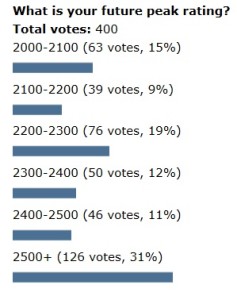Talent in chess
We have been through this one a few times, but I just thought I wanted to run this one past the pollsters…
There are those who do not believe in talent for chess, and there are those who think that talent is everything. Clearly the truth is somewhere in-between. I remember someone on Facebook saying that there is no special talent for chess, only to be told by Peter Heine Nielsen that he knew a Norwegian guy with quite a bit of talent…
Obviously talent without work is poorer than work without talent. But with equal amounts of work, how much does talent add to your abilities?
Rating polls
The final of the three polls about rating makes more sense to view together with the two previous polls. Please draw your own conclusions!
Categories: Polls



If I had started playing chess 10 years earlier and spend the same time on it, I think I would be a strong GM. I’d rather have started five years earlier than have Carlsen’s talent.
I would be somewhat better…
As lazy as I am…I don’t want to spend that much time on studying chess. So the more talented I would be, the less “hard work” I would do:-)
Is a good memory a talent? Is great to all-absorbing interest in something a talent? Is capacity for hard work a talent (as I believe Kasparov has said)? At least, I doubt there is such a thing as innate chess talent apart from these three. Talent really is a much trickier concept than most people think.
These talents are important in my view:
-Good pattern recognition
-Good memory
-Ability to focus
-A fighting mentality
-Strong nervous system
-A brain that operates quickly
-Common sense
If I were forced to play and practice chess, I would be probably about decent FM strenght (2350-2400), but no more than that – no matter what kind and amount of work I could do! I love chess, but too many interests get in the way of the royal game. This scenario could have been the real case ONLY if I would start playing chess when I was 8-10 years old (I started being 21!)
At normal conditions – If I started chess no later than 12-14 and I would practice seriously in a period of 15-20 years, I could achieve about Candidate Master leve (2150-2200).
And as Pawnshredd remarked and noticed: “As lazy as I am…I don’t want to spend that much time on studying chess. So the more talented I would be, the less “hard work” I would do:-)” – the same applies to me! 🙂
PS. I do not regret that I did not achieve “anything special” at chess, because my other parts of life fully compensate the lack of achievement at chess 😉 🙂
I’m currently putting almost all of my limited free time into chess. But I have never figured out the “how to” of how to spend my time efficiently.
I put some hope into that Smith’ “Pump up your rating” would help. It did, a little bit, but not too much. I tried the wood-pecker method and had to realize after a while: I have no talent for calculation. Tactics, yes, I see motives rather quickly. But I tend to fail to analyze move-order issues, I see phantom-pieces in longer variations, can’t evaluate the strategic aspects after lots of exchanges… And I don’t think I could train that – I simply lack the skill to visualize positions after longer move sequences.
So, what “talent for chess” exactly is – that’s debatable. I think I have some talent, but by far not enought to become a GM. And I doubt that would be different if I had started playing chess at 5 and didn’t do anything else – that might have gotten me to IM, but probably not any further. But we’ll never know, and that’s live!
My impression is that strong chess players are often good mathematicians especially in Applied maths and Mechanics.
The Polgars are of course very interesting , that the women’s world champion and by a long way almost the strongest female chess player and at the Tim youngest GM ever were produced by the ‘experiment’.
While another interesting figure at the other extreme is the remarkable progress of GM Jonathan Hawkins who was decent club strength throughout his youth and just1900 at age 20 yet has gained 2550 rating and just won his second British Championship ahead of a 2700 former Chess prodigy David Howell.
Both the Polgars and Hawkins are evidence of the efficacy of training, though surely genetics give people different chess rating potential from the same amounts of training which we could call talent.
@Tobias – Visualization skill is definitely trainable. You need to keep at it. For easy puzzles, a good exercise is to memorize the diagram, then go for a walk and solve from the memorized position. At first you might have to carry the position with you to refresh your memory, but later you will get good at it. Another good practice is to play blindfold rapid (say 30 minutes) against the computer – just have it hide the pieces. It’s not true blindfold rules because you can see the empty board, but it’s good for visualization. To measure progress, when solving hard puzzles write down the ply level at which phantom pieces (or other visualization error, like illegal move) occurs. It’s a much better measure than simply right-wrong.
Prodigies exist.
Argument over.
Interesting article regarding finding talented racers who don’t have the means.
Starting point is that you have people out there who are talented but go unnoticed because of the lack of opportunities. http://www.wired.com/2015/08/best-way-spot-great-racing-drivers-videogames